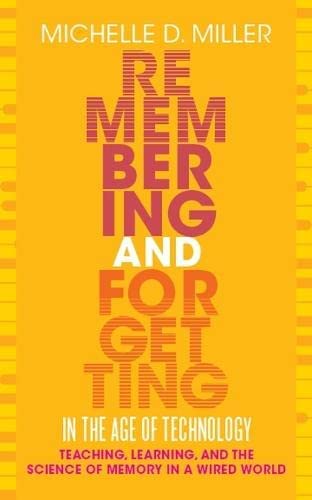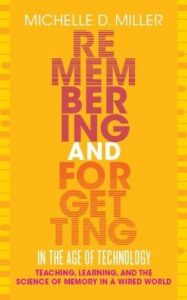

Miller respects the idea that teaching instructors is a social-emotional endeavor, not an act of transmitting a set of best practices. Before beginning to evaluate the science, it is important to understand our preconceived notions and how our value systems bias our perspective. What is hype and what is fearmongering? Where has the science been misrepresented to preserve traditions or sell the next big idea? In all her chapters, as well as the structure of the book overall, Miller helps us to situate ourselves within the larger cultural value systems surrounding this area of cognition. She helps us understand the foundations of arguments and only then does she guide us through the science that supports or refutes some of these beliefs. We cannot seek to improve our practices without first respecting and understanding our current dispositions.
As Miller points out, many of us remember foundational models of memory from introduction to psychology courses or some highlights from a text read long ago. The science examining the mechanisms of memory has come a long way and the basic models have been updated but not yet socialized. These early models led many of us to design instructional material, but it’s time for an update. The science has become more ecologically valid and nuanced, and Miller pulls these updates into the text, not through a dense academic literature review, but by illustrating research findings through our everyday experiences: she shows us that the updates make sense. Moreover, the summaries of the studies presented are accurate and well-cited translations of cognitive-neuroscience for those seeking a deeper dive.
The book’s topics are clearly organized, easily referenced, and situated in a narrative structure enjoyable for a long plane ride or summer beach read. She starts the book with a review of the place technology has in our culture and how we generally feel about it, separating the arguments over morality and hype from the arguments over the impact. In the second chapter, she dives into the science, painting a picture of updated models and evidence. This includes some fun but measured myth-busting. We then get into some very concrete best practices: How can we improve our memory? How can we enhance instruction? And where is memory improvement necessary, and where is it important to rely on technology as a cognitive extension of ourselves? As she moves into the topic of attention, we are reminded that technology has often been demonized, but technology is a double-edged sword; it both supports and distracts. We see in the final chapters a balanced view helping to sort out the wheat from the chafe and set up a framework for evaluating the ongoing rapid development of cultural innovations. Technology will continue to evolve, and we need to develop a healthy, critical, curious, and exploratory disposition towards its integration.
While one gets many very concrete suggestions from this book, it is the framing that really lands this book. It trains the reader to think flexibly about the present and the future. I can’t wait to read it again and share Miller’s insights with my students and colleagues.




